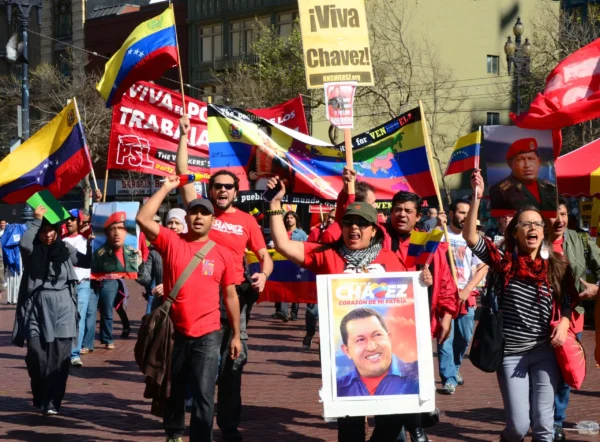Venezuela Begins to Prepare for Presidential Elections
By Alejandra Garcia on March 7, 2024

Chavez – the heart of my country. Photo: Bill Hackwell
Venezuela is beginning the presidential election race as the country marks the passing of Comandante Hugo Chavez. The Venezuelan National Electoral Council issued the announcement on Tuesday, March 5, exactly 11 years after the Venezuelan leader’s death after losing his battle with cancer. In an announcement marked by symbolism, the electoral authorities informed the Venezuelan people that elections will be held on July 28, on the anniversary of the birth of Chavez, who remains an enduring symbol of the Latin American left wing.
With the date now on the calendar it sets in motion an electoral process marked by the constant attempts of the US backed ultra-right to tarnish the democratic process in the Bolivarian nation. For a couple of weeks now, Venezuela has been in the news in the big media emporiums since the decision of the Venezuelan Supreme Court of Justice to ratify the disqualification of right-wing candidate Maria Corina Machado to run in the next presidential elections.
But who is Machado? For so many years, this “patriotic” Venezuelan leader -as she calls herself-has tirelessly encouraged the governments of the United States and the European Union to impose harsh economic sanctions of all kinds against the Bolivarian Republic of Venezuela. Today, Venezuela is the victim of 930 unilateral coercive sanctions that have affected all areas of economic activity and have caused severe hardship to the Venezuelan population as a whole. Imagine what this kind of leader, who calls for more pain and suffering, would be like as president?
Since the news broke, the hegemonic media and governments – the same ones that completely silences the ongoing genocide in Gaza – have questioned the legality of the upcoming elections in the Bolivarian nation. “Proscription, exclusion, persecution!” they scream while coveing up the real truths of Machado, their alleged “favorite” in the presidential race.
Machado was tried for her signing of the “Carmona decree” that validated the Coup d’état in Venezuela on April 10, 2002. She was also tried for conspiracy because an NGO she created and she also directly received a 53 thousand dollar subsidy from the National Endowment for Democracy (NED), approved by the U.S. Congress. For both charges, she was sentenced to 28 years in prison but was given amnesty by Chavez.
“In no other country could Machado have continued doing politics as she has done in Venezuela. In most European countries, she would have had to face prison with long sentences. The same would have happened in Argentina, Brazil, Chile, Mexico, Peru, or any other country in the region,” Argentine political scientist Atilio Boron highlighted in an article published by the multiplatform teleSUR.
The presidential campaign will take place between July 4 and 25, with President Nicolás Maduro – who has been at the helm of power for the last 11 years – as the strongest candidate, once again, according to Venezuelan authorities. The last presidential elections were held in May 2018, when Maduro won his first re-election for a six-year term.
The government’s call is to keep the dialogue open among all political movements, but not to allow those who have done so much harm to the people to have the slightest chance of coming to power, Machado among them.
“The right-wing has set her up as a sort of patriotic Joan of Arc when, in reality, she is a scandalous agent of the empire and an accomplice of the criminal plundering perpetrated against her own country. That is the true portrait of the ‘heroine’ or ‘freedom fighter’ presented by the imperial media and the U.S. government itself, which is now redoubling its sanctions against the people and government of Venezuela,” Boron concluded.
Eleven years after the loss of President Chavez, the people will return to the polls to choose the path to follow for the next six years. The people know the efforts of the government to defend the sovereignty of the country, the most vulnerable ones, and that it has faced and overcome the most diverse aggression. The Venezuelan people will know how to defend democracy once again.
